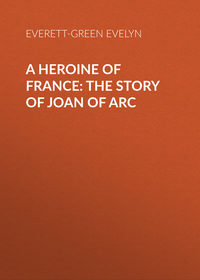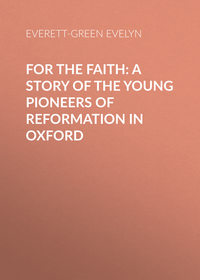 полная версия
полная версияA Clerk of Oxford, and His Adventures in the Barons' War
This he preferred greatly to begging, notwithstanding that mendicancy had been made respectable, if not honourable, by the friars, and that to give alms to a poor clerk, or reward him for singing a "Salve Regina," or saying a prayer or grace, was one of the regular and esteemed forms of charity.
"And remember, good lads, that there are homes in the city open to such as ye," said the Abbot, as he bid them adieu. "There is Glasson Hall in the High Street, which pious John Pilet gave to Osney Abbey not long since. We might find room for the pair of you there, if you were disturbed in your nest. There is Spalding Court in Cat Street, which the burgesses of the town have bought for the use of poor clerks; and there be Halls where the poorer clerks serve the wealthier, and earn a pittance thus. Ye will find many ways of living; and pray Heaven we have a good harvest this year, so that the present scarcity may cease."
And with a nod and a word of blessing the Abbot dismissed his young guests.
"Let us take a prowl round the town," said Jack, as they turned their backs upon the stately buildings of the Abbey, "there is so much to see at every turn, and I would fain know the streets and lanes of the city by heart. We must enter by the West Gate that we left, but we will wander round the walls and see what lies in the south ward of the city."
Leofric willingly agreed, and they retraced their steps as far as the gate, where they were at once hailed by the same sentry as had spoken to them before.
"Fortune favours you, honest lads," he said. "The Constable of the Castle has just sent down this purse, to be given to the two clerks who saved the Mistress Alys from hurt when her palfrey took fright," and he put into the hands of Jack a small leathern satchel, in which were a goodly number of silver pieces.
"Now this is luck indeed!" cried the youth, as they took their way onward. "We meet with success at every turn. Methinks that either thou or I must have been born beneath a lucky star."
But they had little time for discussing their good luck, for almost immediately they found themselves in the heart of the Grey Friars' colony, which lay close to the West Gate, just where there was a gap in the city wall, probably owing to the proximity of a marshy tract which rendered the protection of the wall of comparatively little use. Trill Mill Stream wound round the little colony, and formed its southern limit. The parish was that of St. Ebbs, perhaps the poorest in Oxford. This was doubtless why the Minorites, or Grey Friars, had made of it their headquarters. To dwell among the poor, and to live as poorly as any of them, was their principle and practice; and down in these low-lying, swampy districts, fever, ague, even leprosy abounded, and the Friars toiled with might and main amongst the sick.
The boys saw them going forth by twos and threes, or passing in and out of their low, poverty-stricken buildings. It was against the desires of their founder that they should ever possess property or aspire to learning; but the practical inconvenience of the one prohibition, and the thirst for knowledge which was growing up in the hearts of men at this time, militated against the strict code of St. Francis.
The Franciscans made their houses as simple and unpretentious as possible. They lived the most self-denying of lives; but they were beginning to frequent the schools, and to teach in schools of their own, and although there were often drawbacks and difficulties placed in the way of their advancement, they had already many great and notable scholars in their ranks.
The main difficulty was that by statute no one might begin in theology who had not first taken a degree in Arts, whilst the vows and rules of the monks and friars debarred them in many cases from any sort of secular studies. They were so well qualified to lecture in theology that it was often difficult to refuse their plea; and yet the statutes stood in the way.
As the boys reached the corner of Milk Street, they observed a Franciscan Friar of venerable aspect coming towards them, and instinctively Leofric bent the knee as if to ask a blessing.
The old man stood still, and smiled benignly. It was one of the characteristics of the Grey Friars that, in spite of the self-denial and austerity of their lives, they were more uniformly cheerful, kindly, and even merry in their talk and ways than any other of the religious orders. For this reason, perhaps, they were beloved above others; and the great ones of the world, as well as the poor, came to love and venerate them.
"Peace be with you, my children," said the Friar. "Come you as strangers to this city? Methinks you have the air of the country clinging to you yet."
"We did but arrive yesterday," answered Leofric; "and we have scarce the right to call ourselves clerks. But that is what we hope to be soon, so as we can make up our minds where we shall gain the best learning for such fee as our purse will enable us to give."
"You must needs first study the Trivium and Quadrivium of Arts," said the Friar, when he had questioned them a little more as to their intended manner of life; "but since I hold that no learning is complete that doth not embrace the study of the Word of God, come ye both, if it please you and ye have time, to the school of our order, where I strive to impart a few crumbs of knowledge to our clerks and younger brethren. Many lads like ye twain come without fee, and glad shall I be if any poor words of mine can give help or comfort."
The boys would have stammered out some words of thanks, but the Friar put them aside with a smile.
"Nay, nay, lads, we are sent here not for our own but for others' good. Ask for the School of the Franciscans, and for Brother Angelus. Most mornings from nine till eleven I am to be found there. You will be welcome. Go in peace."
"We will of a surety go," said Leofric, as they pursued their way. "He had the face of a saint. I trow that this is a right godly place. We get kindness from all we meet."
"Methinks it is thy face that wins it for us," quoth Jack, with a laugh; "thou hast somewhat the face of a saint thyself."
There was some shrewd truth in this remark. Leofric's was a countenance that could not but attract; and at that time there were such numbers of rude, rough, ill-mannered and ill-living clerks in the place, that favourable notice was often bestowed upon such as appeared of gentler nature and manners. All the religious brotherhoods were more or less on the look-out for likely pupils, and though the more enlightened of their members would not put pressure upon lads to make too early a choice of the cloister life, or of that of the friars, they gladly recruited their ranks from such promising students and clerks as they succeeded in drawing beneath their influence.
As the boys stood looking down Milk Street, they continued to see the Black Friars flitting busily to and fro, fetching and carrying their simple goods and chattels; and prompted by curiosity, they turned into the Jewry, and were soon gazing with the greatest interest at the Jewish denizens of that quarter.
The Jews had had a footing in Oxford from the very early days; they had a synagogue in Fish Street, nearly opposite to St. Aldate's Church. (It may be noted that the old Fish Street is the present St. Aldate's.) They were, of course, the most moneyed class in the city, and they had their own code and manner of life, were exempt from the operation of the common law, and were treated as serfs of the King. Had it not been that the Kings protected them from pillage by their neighbours, in order to plunder them themselves, the Jews would scarcely have continued to exist. The people hated and feared them, even whilst they borrowed from them at a rate of usury limited by statute. But they were too valuable to the Crown to be exterminated, and the Black Friars had settled amongst them in the hope of effecting their conversion.
For many years they had considerable success, so much so that the King established a house called the Guild Hall for the reception of the baptized Hebrews. It was not really their lack of success (although fewer conversions had taken place of late) but lack of room which occasioned the flitting of the Black Friars from the Jewry. They were not all of them leaving immediately, even now; but their new building was almost complete, and a number of the brothers were about to take their departure, hence the excitement prevailing in the locality of the Jewry.
When the lads had gazed their fill at the strange dress and dark faces of the Jews, and had listened to their talk, and their covert jests as they secretly derided the Christian brothers who had dwelt so long amongst them, they turned southward down Fish Street, and then by St. Frideswyde's Street to the great group of beautiful and ancient buildings comprising St. Frideswyde's Church and Abbey – the oldest in Oxford – occupying the site where Christ Church now stands.
Grave, stately looking men walked with slow, meditative steps about the enclosure in which stood those buildings. They were habited in a long white coat of cloth down to the heels, girt about with a leather girdle; over this was a short surplice of linen, and over that again a short black cape that reached to the elbows. On their shaven heads they wore a black square steepled cap. These were the Canons Regular of St. Augustine – the same order as those of Osney.
Here again the walls were broken down, and had crumbled to decay, groves and meadows and fish ponds extending southward to Trill Mill Stream. The boys looked about them in silent wonder, but nobody addressed them; and though they would have liked to steal into the church and see St. Frideswyde's shrine, they did not venture to do so, fearing that they would be regarded as intruders in that sacred place.
"Hugh le Barbier was telling me of notable miracles done at yon shrine," said Leofric, as they turned away at length up St. Frideswyde's Lane. "St. Frideswyde was a daughter of an ancient king, and she built a nunnery here, and was herself a nun. Afterwards it became a place for monks, and now it is an Abbey; but the shrine of St. Frideswyde still remains, and great wonders are wrought there."
"Hark!" suddenly cried Jack, whose ears had been more attentive to some sound in the distance than to his companion's words, "I hear the noise of a tumult. There is something stirring not far off. Let us e'en run and see what it be. Methinks I hear the sound of blows and shouts."
Leofric heard the same sound which had attracted Jack's attention. It seemed to proceed from a short distance off, and they hurried along till they reached the corner of Great Jewry Lane where it joins Shydyard Street (now Oriel Street), where the shouting began to take more articulate form, and the boys heard the words, "North, North! – South, South!" bawled and yelled from scores of throats.
"It is some fray betwixt the clerks," said Jack, who had not listened for naught to Gilbert's tales during the night they camped by the fire in the forest. "Did he not tell us that they were banded into two or more great bodies, North and South, and that they were ofttimes coming to blows together? Haply we had better stand close in this doorway, and let the rout go by. Clerks are killed by their fellows in the open streets every year, if what we hear be true, for nothing worse than belonging to the adverse faction."
Leofric, who though no coward was by nature placable, and adverse to blows, was ready enough to take this counsel, and set his back against the door in the little porch which offered shelter to the pair. The fight seemed to be coming their way, and presently a few clerks scudded by, yelling, laughing, cursing; brandishing their clubs and hurling all manner of foul and derisive epithets at those behind them, from whom, however, they evidently thought it well to flee. Others followed, some having cut heads or bleeding noses, dishevelled, out of breath, angry, yet inclined to make game of themselves and others all the while.
"North! North! North!" they shouted, interlarding their words with many an oath and epithet that need not be transcribed. "Ye coward Southerners, ye only dare to attack when ye be ten to one. We will give you back as good as ye gave! North! North!"
Plainly the pursuers were close behind the flying feet of the last fugitive, when suddenly the rout was brought up short by the appearance of a tall man in a long gown, with a weapon at his side, who came round the corner at a quick pace, and confronted the rioters with stern glances.
"How dare you disturb the peace again, you good-for-nothing brawlers?" he cried in ringing accents. "Let me have such another scene within the week, and I will have some of you to answer for it in the Chancellor's Court. As if it were not enough that you must be fighting the burgesses, fighting the citizens, fighting the Jews, but ye must be fighting one another too, and that in broad daylight, when you should be at your studies. To your Halls and lodgings, every man of you; and if I hear of such another brawl as ye come from lecture, I will deal differently with some of you."
The clerks, who had pulled up suddenly at sight of this stalwart functionary, now began to slink away this way and that. Many of them were mere lads, led on by the boyish instinct of fighting; a few were evilly-disposed rogues, who were always to be found in the streets, ready for any brawl; others, again, were scholars who had followed in the wake of the crowd, with an idle interest in anything that savoured of a fight rather than with any particular desire to take part in it.
These sorts of frays were of almost daily occurrence in old Oxford, and only when they became too numerous or too severe was any particular notice taken of them. The students for the most part lived and brawled, studied and played, very much as it pleased them, and a fight, with many or with few, was part of the day's work.
Jack espied Gilbert at the edge of the crowd, and made for him quickly.
"What is the matter? and who is he that stayed the fight?" he asked, with eager curiosity; and Gilbert answered, laughing, —
"There is naught the matter; the fight was but a bit of play as the men came out from lecture. We have such almost every day, and they seldom come to more than a few cracked crowns. Yon man of the gown is the Proctor of the South. There be two such in the University, one for the North and one for the South; and I trow they have their hands full to keep order sometimes! But come along, let us to dinner, and ye shall tell your news."
CHAPTER V
THE NEW LIFE
Before a week had passed away, Leofric and Jack felt as though they had been months at Oxford, so many new experiences had been crowded into that short space.
The more they saw of the strange life of the place, the more glad were they of the chance which had given to them this little private shelter of their own, instead of casting them amongst a number of strange clerks in one of the poorer Halls or lodgings of the city.
For in the days of its infancy the University had enough to do in protecting its own liberties from outside attack. It was therefore unable to exercise individual authority over its heterogeneous members. It provided instruction for them, it guarded their persons jealously from assaults from without, and fought their battle right lustily when jealous townsmen or papal emissaries sought to interfere with liberty or life. But for the rest, the clerks and scholars lived in a state of glorious and almost barbaric liberty, and all that Chancellor or Proctors could hope to attempt was to restrain any serious outbreaks of violence, either between clerks and citizens, or between the various sections of the clerks themselves.
Open rioting in the streets was checked as far as possible; but an immense amount of roistering and disorder could and did prevail without let or hindrance, and there was no certainty from day to day that some bloody collision might not occur in the city which might have a serious termination.
Stories were told of clerks who had been set upon and killed by angry citizens, of citizens who had been slain by clerks, of Masters even who had met with injuries too often fatal in their effects, sometimes from the hands of citizens, sometimes from those of scholars inflamed by passion or drink.
There had been times when the King had had to interfere in order to calm the strife between the contending parties. There had also been times when the Masters and scholars had deserted Oxford by hundreds, if not thousands, and had threatened to establish themselves in other localities. This had been done when the citizens had put upon them some marked indignity and affront, and had generally resulted in the submission and humiliation of the town. For, as was pointed out to the burgesses, the importance and prosperity of Oxford mainly depended upon the presence there of this school of learning, and if they drove away the scholars by their ill-judged enmity, they were signing the death-warrant of their own city.
It was often to these quarrels and their adjudication that the endowments (if such a word can be employed) of the University were owed. The citizens would submit, and agree to pay so many marks a year in token of their penitence, and these moneys were called "chests," and formed a fund from which poor scholars might borrow without interest, leaving a pledge behind; and private individuals would sometimes start a similar chest, from which system gradually developed the scholarships and exhibitions of our own days.
But the life of the infant University was a very strange one as compared with the collegiate system which gradually grew out of it. Thirteen or fourteen was a common age for a youth to commence life as a clerk, and even at that tender age very little supervision was given him.
Originally the University copied to a certain extent the guilds of a city corporation, and as a seven years' apprenticeship was imposed upon lads entering trade guilds, so a seven years' course was expected of a student between the date of his entry as a clerk and the time at which he might take his M.A. degree. In the previous century there were regular University guilds, and as the University was international, and men from all countries came thither, these guilds naturally partook of a national character, men of the same language consorting together, so that different Halls became associated with the names of different nationalities.
Even amongst the inhabitants of the British Isles there were distinctions and race divisions. The Welsh formed a colony of their own, whilst North and South were the two main factions in the place in the thirteenth century, and these brawled terribly at times between themselves.
Even when no actual brawling was going on, the streets of Oxford after dusk were places where it was needful to walk warily. By day studies and games occupied the clerks the best part of their time; but with the setting of the sun a stop was put to these occupations. Candles were dear, firing was often scanty, and the close, ill-smelling Halls, where the rush-strewn floors were often not cleaned for weeks together, became almost intolerable when shut up. Naturally enough, the clerks preferred to sally forth into the streets, some to drink or sing songs at the taverns, others to parade the streets, shouting and joking, and playing any pranks that entered their heads. When it is remembered that almost every person in those days carried arms of some sort, and that the most trifling quarrel provoked blows, it may well be understood that the evening hours in the city were anything but peaceful, and some sympathy can be felt with the citizens in their enmity towards the gownsmen, even though these were a source of profit to them.
Evening by evening Leofric and Jack heard hideous sounds of drunken revelry proceeding from the various streets in the vicinity, and if ever they had the curiosity to parade the town after dark, they were amazed at the disorder and violence which seemed to prevail.
"I had thought," said Leofric, "that Oxford would be full of grave and reverend doctors, whose presence would impose order and gravity upon all. But methinks it is full of wantonness and revelling and fighting. Right glad am I, good Jack, that we have our own little nest on the walls. I should be loth indeed to belong to yonder herd."
Jack was not quite so particular, and a frolic in the streets, so long as things did not go too far, was rather agreeable to him than otherwise. Sometimes he would steal out, whilst Leofric was poring over his illuminating work, and enjoy a stroll with some of the clerks of the better sort with whom he had made acquaintance, and as he grew used to the strange ways of the city, he found much to amuse and interest him.
Leofric had purchased, with the money given him by the Abbot of Osney, some materials to enable him to work at the illumination of his vellum leaves, and was doing some fine and beautiful illumination which was certain to fetch him a good sum at some wealthy man's house. Jack looked on in amaze at his skill, but sometimes felt the time hang a little heavy. On such occasions he would sally forth to do the necessary marketings, or to collect fuel, and so forth; and often Hugh le Barbier would drop in to watch Leofric at his toil and exchange ideas with him on many subjects.
Hugh was of a studious turn, and he had the same sort of refined instinct as Leofric, and shrank from the tumult and rowdiness of the streets. He had not yet succeeded in finding a Hall quite to his mind, and was lodging at present at "Dagville's Inn" (now the Mitre), which belonged in those days to one Philip Pady, a burgess, who had rented it to an Italian of the name of Pedro Balzani, who had lived long in the city, and made an excellent innkeeper, having great skill in culinary matters, and a good English wife who understood the likings of her countrymen.
"Thou must come and sup with me one of these days," said Hugh one day, as he sat with Leofric after Jack had sauntered forth. "I have a comfortable chamber enow, though somewhat chilly when the wind is riotous; but I have found favour in the eyes of mine host, and I take my meals with him and his family. This is not a grace he accords to all who come, nor even to all who stay long in his house, as I am doing. And, in truth, he does right to be cautious; for he has a pair of wonderfully beauteous daughters, twin sisters, and so much alike that it was long before I knew one from the other."
Leofric looked up with a gleam of interest in his eyes.
"Beautiful, thou sayest? I was wondering if perchance I could find in this place a beautiful face; for see thou here, I would fain on this square of vellum portray an angel with a roll in his hands, upon which I shall inscribe, in fine penmanship, certain prayers. I have some small skill in drawing faces. I used to amuse the monks of St. Michael by taking likenesses of them, and they said I did it well. But it is not easy to find a face for an angel, though there are some pretty lads here and there walking the streets. I wonder if I could find an inspiration in the face of your twin sisters."
"Thou shalt come and see," quoth Hugh eagerly; "methinks it would please them well to be thus portrayed. For my part, I think that Linda's face would be the better; it is ofttimes full of a sweet seriousness and repose, whereas Lotta is all sparkle and fire; and it is by these two expressions that I begin to know them the one from the other, though, should Lotta be pensive and Linda merry, I am at fault again!"
"I should like to see them," said Leofric. "I have heard of such things – sisters so alike that none may distinguish between them – but I have never seen such. It must be something strange."
"Thou shalt come and see; thou and Jack shall sup with me to-morrow. I have spoken to Balzani about you both before now. Thou hast a quick eye and a keen understanding, and I would ask what thou dost think of Tito Balzani, the son of mine host. For my part I like him not, and methinks he has no love for me. He consorts with one Roger de Horn, one of the biggest braggarts and bullies of the place. He calls himself a clerk, but it is little of learning that will ever get into that pate of his. He, too, comes to table with mine host and his family, and methinks he is vexed and jealous because the same grace is accorded to me. He speaks insolent words anent upstarts and fine-gentlemen fops; and it is plain that he seeks a quarrel with me, or else to drive me to other quarters."









